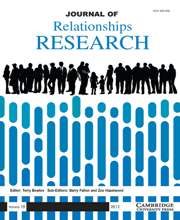Article contents
The Effects of Social Status and Self-Esteem on Imitation and Choice of a Popular Peer
Published online by Cambridge University Press: 07 December 2015
Abstract
This study addressed the role of influencer and influencee peer status in social influence of status-unrelated behaviours among emerging adults, while disentangling two forms of peer status, being liked (preference) and being powerful (popularity). Peer influence was examined in 67 women (M age = 20.5 years, SD = 2.1 years) using an experimental design. Popularity of the influencers and influencees (participants), as well as influencees’ preference and self-esteem were considered. Peer influence was measured through imitation of status-unrelated behaviours and task partner choice. In both tasks, influencees moved away from, rather than towards, a popular peer. Popular young women with low self-esteem were most likely to imitate a popular peer. Unpreferred young women with high self-esteem were least likely to imitate a popular peer. The findings demonstrate that the role of peer status in social influence processes is not limited to adolescence, and that the peer status of influencers and the influencees continues to affect social influence on status-unrelated behaviour in emerging adulthood.
Information
- Type
- Research Article
- Information
- Copyright
- Copyright © The Author(s) 2015
References
- 7
- Cited by

